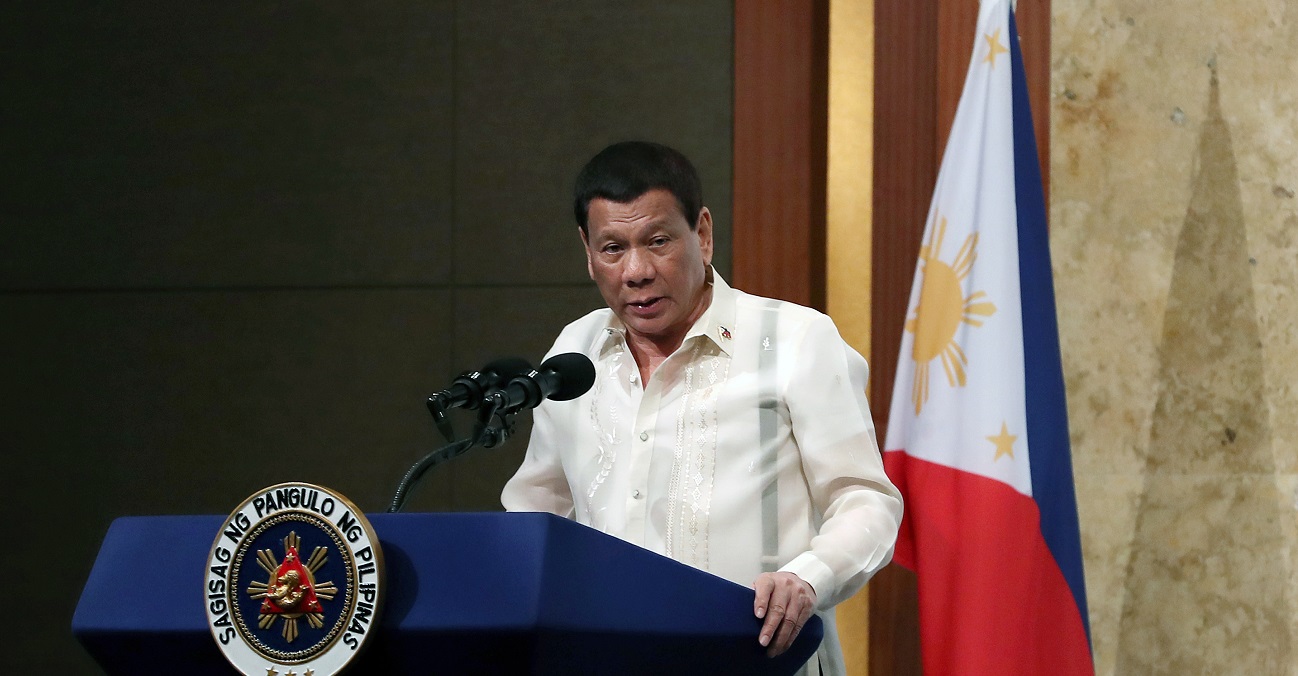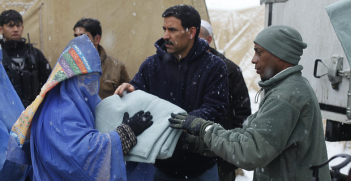“Red-tagging” and the Rule of Law in the Time of COVID-19
 www.korea.net)
Official Photographer : Jeon Han
This official Republic of Korea photograph is being made available only for publication by news organizations and/or for personal printing by the subject(s) of the photograph. The photograph may not be manipulated in any way. Also, it may not be used in any type of commercial, advertisement, product or promotion that in any way suggests approval or endorsement from the government of the Republic of Korea.
----------------------------------------------------
로드리고 두테르테 필리핀 대통령 한-필리핀 비즈니스 포럼 참석
2018-06-05
롯델호텔
문화체육관광부
해외문화홍보원
코리아넷
전한" title="Rodrigo Duterte Philippines President attends business forum at Lotte Hotel in Seoul
June 5, 2018
Lotte Hotel, Jung-gu, Seoul
Ministry of Culture, Sports and Tourism
Korean Culture and Information Service
Korea.net (www.korea.net)
Official Photographer : Jeon Han
This official Republic of Korea photograph is being made available only for publication by news organizations and/or for personal printing by the subject(s) of the photograph. The photograph may not be manipulated in any way. Also, it may not be used in any type of commercial, advertisement, product or promotion that in any way suggests approval or endorsement from the government of the Republic of Korea.
----------------------------------------------------
로드리고 두테르테 필리핀 대통령 한-필리핀 비즈니스 포럼 참석
2018-06-05
롯델호텔
문화체육관광부
해외문화홍보원
코리아넷
전한" />
www.korea.net)
Official Photographer : Jeon Han
This official Republic of Korea photograph is being made available only for publication by news organizations and/or for personal printing by the subject(s) of the photograph. The photograph may not be manipulated in any way. Also, it may not be used in any type of commercial, advertisement, product or promotion that in any way suggests approval or endorsement from the government of the Republic of Korea.
----------------------------------------------------
로드리고 두테르테 필리핀 대통령 한-필리핀 비즈니스 포럼 참석
2018-06-05
롯델호텔
문화체육관광부
해외문화홍보원
코리아넷
전한" title="Rodrigo Duterte Philippines President attends business forum at Lotte Hotel in Seoul
June 5, 2018
Lotte Hotel, Jung-gu, Seoul
Ministry of Culture, Sports and Tourism
Korean Culture and Information Service
Korea.net (www.korea.net)
Official Photographer : Jeon Han
This official Republic of Korea photograph is being made available only for publication by news organizations and/or for personal printing by the subject(s) of the photograph. The photograph may not be manipulated in any way. Also, it may not be used in any type of commercial, advertisement, product or promotion that in any way suggests approval or endorsement from the government of the Republic of Korea.
----------------------------------------------------
로드리고 두테르테 필리핀 대통령 한-필리핀 비즈니스 포럼 참석
2018-06-05
롯델호텔
문화체육관광부
해외문화홍보원
코리아넷
전한" />
The Sahel is the borderland between the Sahara Desert and the African savannah and forest lands further south. The region is higher on the international agenda than ever, and the magnitude of international assistance and international interventions unprecedented.
Much of this huge area, three million square kilometers, consists of a land mass where public power does not reach very far, insurgencies are frequent, and migration and smuggling have become part of the livelihood as jobs are as few as effective government interventions. The Sahel therefore confronts global policymakers with a whole range of serious challenges – fragile states, poverty, refugees and migrants, transnational organised crime, and jihadist insurgencies.
France is present in the region with a large military force (Operation Barkhane), the United Nations has a large peacekeeping force in Mali (MINUSMA), the European Union has deployed a police and rule of law mission (CIVCAP-Sahel), and there is an EU military training mission in Mali (EUTM), just to mention some of the largest international interventions. Nonetheless, the situation on the ground has gone from bad to worse. The conflict in Mali has spilled over from the north to the centre of the country and across the border to Burkina Faso. The border regions of Niger have become the centre of attacks by armed jihadi rebels with mass killings as the result.
Weak states
All the states in this region suffer from state fragility and weak administrative capacity. Individually, none of them can respond adequately to the challenges they face. The weak states that, in the eyes of their populations, lack credibility and legitimacy. In combination with resource scarcity, the result is a lethal cocktail. With resources becoming even scarcer, conflicts over access to natural resources increasingly turn violent. This has opened new spaces for violent Islamic insurgencies and transnational organised crime.
In peripheral areas of the Sahel, a void has emerged that neither the states nor international responses have been able to adequately address. This is exacerbated by the multidimensional nature of the crisis of the Sahel: it is about conflict and chronic violence, but it is also a humanitarian crisis caused by a combination of weak statehood and stalled development. Its consequences are human displacement and large-scale migration.
The multidimensional features of the crisis confront the international community with huge challenges. The very weakness of the states in the Sahel means that they lack the institutional response capacity needed to make conventional large-scale external crisis responses effective.
In abstract terms, we know what is required: the states of the Sahel need stability, transparency, and legitimate institutions that can extract revenues from taxes, fees, and duties to deliver economic development, services, and make their countries more resilient to climate change effects. The problem is how to achieve this in fragmented, conflict-prone societies where the very idea of the state has eroded, if not completely vanished. The challenge that this constitutes is obvious when we consider the track record of the international community to assist state building efforts in fragile states. Most often, these fall short of achieving their stated objectives, even at times making a difficult situation turn worse, leaving countries on an artificial international life-supporting system. This may prevent total state collapse, but it certainly does not represent a sustainable path to recovery, stability, reconciliation, and development.
Not an ungoverned space!
Assistance from the international community to a process of sustainable development in the Sahel must be knowledge-based, and it must be based on a grounded understanding of what these states are and how they work. Unfortunately, a grounded, knowledge-based approach is still at odds with the dominant perspective for understanding these challenges where the states of the Sahel are defined as “lacking” what modern states are supposed to have: control of borders, monopoly on violence, procedures for taxation and dispute settlement, and a legitimate design for transfer of power from one ruler or regime to another.
The peripheries of the Sahel are often depicted as an ungoverned space – a geographical area characterised by an absence of state control and state sovereignty, a lawless zone, a no-man’s land. The implication being that as state capacity has eroded and collapsed, large parts of the Sahel have turned into “ungoverned spaces” preyed upon by a coalition of forces of transnational crime and global jihad.
However, while few would disagree with a general statement such as “the Malian state is too weak,” or that drugs are trafficked through the Sahel and that forces aligned to global jihad are present in this region, such blunt observations tell us very little about the nature of local conflict dynamics. My concern is that this concept is employed in a way that is less analytical than categorical, leasing to a narrow, checklist approach to policy that may result in extremely misguided planning and interventions.
There is no doubt that illicit goods are transported across the Sahel. This is criminal activity. There is also a wide spectrum of projects of political and social resistance at play – some peaceful, others armed. Some are of a more secular origin, others religious, and some of these are also involved in the transport and protection of illicit goods. Some involved in this business are primarily profit-seeking actors, others mainly involved to fund resistance projects. However, many are also involved in various minor roles in both smuggling operations and resistance projects as a coping strategy. Increased climatic variability and few adequate responses from governments and international organisations means that people must carve out a livelihood wherever they can, and for some but not all, participation in trafficking or an armed group has become a new mode of survival.
Thus, what we need to focus much more on is understanding the continuity between different contours of criminality, coping and resistance, and the subsequent logic behind these activities – a logic quite different from the one to which an “ungoverned space” lens directs our analyses and polices towards. Donors and external stakeholders need to understand that what is needed is long-term approaches that emphasizes state-building over narrow security sector support. It is possible to turn the situation around, but the window of opportunity may come to close sooner than we think.
Time is short, as climate change effects will manifest themselves in this region, and they will have devastating consequences if the states’ agricultural sectors does not become more climate resilient. This can only happen if the underlying causes of conflict are addressed, and this is not violent Jihadism, but land rights issues. Improving the security conditions in the Sahel is necessary, but neither inhabitants of this region nor external stakeholders will find security through military means only. Priorities must be set right, and at the heart of this must be an improvement of living condition and a new system of governance that makes it much less possible for Jihadi insurgents to appropriate local land rights conflicts.
Morten Bøås is Research Professor at the Norwegian Institute of International Affairs (NUPI). His most recent publications include, Africa’s Insurgents: Navigating an Evolving Landscape, Lynne Rienner, 2017 (with Kevin Dunn) and Doing Fieldwork in Areas of International Intervention: a Guide to Research in Violent and Closed Contexts, Bristol University Press, 2020 (with Berit Bliesemann de Guevara).
This article is published under a Creative Commons License and may be republished with attribution.





